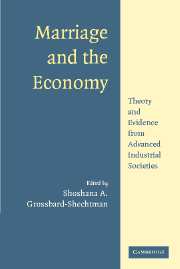Book contents
- Frontmatter
- Contents
- List of Figures
- List of Tables
- List of Contributors
- Foreword
- Acknowledgments
- Marriage and the Economy
- 1 Marriage and the Economy
- PART I THE ECONOMICS OF MARRIAGE AND DIVORCE
- PART II EFFECTS OF MARRIAGE ON INCOME USES
- PART III EFFECTS OF MARRIAGE ON TIME USES
- 9 Marriage, Household Production, and Earnings
- 10 Marriage and Work for Pay
- 11 Marriage, Work for Pay, and Childcare
- 12 Marriage and Home-Based Paid Employment
- PART IV MARRIAGE AND THE MACROECONOMY
- Index
9 - Marriage, Household Production, and Earnings
Published online by Cambridge University Press: 07 December 2009
- Frontmatter
- Contents
- List of Figures
- List of Tables
- List of Contributors
- Foreword
- Acknowledgments
- Marriage and the Economy
- 1 Marriage and the Economy
- PART I THE ECONOMICS OF MARRIAGE AND DIVORCE
- PART II EFFECTS OF MARRIAGE ON INCOME USES
- PART III EFFECTS OF MARRIAGE ON TIME USES
- 9 Marriage, Household Production, and Earnings
- 10 Marriage and Work for Pay
- 11 Marriage, Work for Pay, and Childcare
- 12 Marriage and Home-Based Paid Employment
- PART IV MARRIAGE AND THE MACROECONOMY
- Index
Summary
Survey data and time diaries indicate that employed married women spend two to three times as much time on housework as their husbands. This chapter deals with two important sets of implications associated with time spent on home production: labor market outcomes and legal issues involving home production.
First, time in home production affect labor market opportunities and outcomes, via lower job skill acquisition, more limited professional opportunities, and lower wages. Second, home production has important implications in a litigation context. In the case of wrongful death litigation, thee conomic loss will be the sum of the value of lost earnings and the value of lost home services. In many cases, the economic loss of a wife's home services exceeds her earnings loss. This is due to the large amount of time that wives spend on home production, as well as to the lower market earnings that result from this time allocation. Similarly, in many divorce cases, the main claim of wives to the assets accumulated during marriage is their contribution to home production.
This chapter discusses economic theories that lead to the division of home production time along observed gender lines, evidence on the allocation of home production time between spouses, and the economic consequences of this division. To demonstrate the salient legal issues, I discuss the Wendt v. Wendt divorce case, in which Lorna Wendt argued that her role as a corporate wife was essential to her husband's career success, entitling her to a larger share of the marital assets than conventionally awarded under Connecticut law.
WHO DOES THE HOUSEWORK: THEORY
Does marriage itself, or expectations of marriage, lead to women earning less than men? Under certain assumptions, economic analysis predicts precisely this outcome.
- Type
- Chapter
- Information
- Marriage and the EconomyTheory and Evidence from Advanced Industrial Societies, pp. 201 - 221Publisher: Cambridge University PressPrint publication year: 2003



